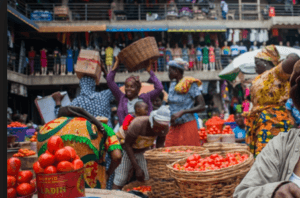Ghana’s GDP of 3.6% in 2016 lowest in 23 years – Akufo-Addo
 In 2016 Ghana’s GDP declined to 3.6 per cent and the President says it is the lowest growth in 23 years.
In 2016 Ghana’s GDP declined to 3.6 per cent and the President says it is the lowest growth in 23 years.
In his first State of the Nation Address since his election and inauguration, President Nana Akufo-Addo said Ghana’s economic growth has also declined dramatically.
Adding, “Notwithstanding the record amount of financial resources at the disposal of the previous government, Ghana’s GDP growth in 2016 (including oil) is estimated at 3.6 per cent. This is the lowest GDP growth in about 23 years.”
He also pointed out that the country’s banking sector has not escaped the economic decline and has become increasingly fragile.
“Bad loans in the banking sector have risen significantly. Economic and Financial data from the Central Bank show that non-performing loans have risen sharply from 11.2 per cent in May 2015 to 17.3 per cent in December 2016. The recent Asset Quality Review of Banks shows significant vulnerability of banks to current economic conditions, with many exhibiting significant weaknesses,” he said.
The President said low growth, rising rate of unemployment, high fiscal deficits, high and rising debt, and increased depreciation of the cedi, high cost of food, housing and utilities and high non-performing loans, amongst others, are symptoms of deeper structural problems that will require a range of reforms, beginning immediately and spanning the short, medium and long terms.
“We are going to have to implement some tough, prudent and innovative policies to get out of this financial cul-de sac and rescue this economy, restore fiscal discipline and debt sustainability as well as increase economic growth,” he said.
“Mr. Speaker, it gives me no joy to tell the story of the economy as it is – as we inherited it. Too much time, energy and resources were spent in the past, in my view, without a deliberate, conscious assessment of their impact on jobs, and whether or not we were spending wisely to improve the lives of the people, communities and businesses. But, I was not elected by the overwhelming majority of the Ghanaian people to complain.
I was elected to get things done. I was elected to fix what is broken and my government and I are determined to do just that. At the beginning of March, the Minister for Finance will come to this House to lay out in the national budget the details of our economic policy and the clear roadmap that we have laid out for taking the country out of its current predicament and onto a sustainable path of recovery, jobs creation and prosperity.
I am absolute in my confidence that we have the programme, the competence, the commitment, and the goodwill of the people to turn things around. By the Grace of God, we will succeed and I believe this House knows it too,” he said.
He indicated that in the immediate term, targeted legislative policy and institutional reforms will have to be undertaken to unleash the suppressed potential of the economy and allow Ghanaian entrepreneurship to rise and thrive, domestically and internationally.
“For too many young people, unemployment is sadly the reality of the start to their adult life. For years, for generations, it was assumed and guaranteed in this country that the quality of life of every generation would be an improvement on that of their parents. We are now faced with the phenomenon of parents looking on in frustration as their grown-up children remain at home, without the means to strike an independent life by themselves.
This generation of Ghanaians dares not be the one to reverse this natural trend. We must create the atmosphere that generates jobs. We must boost the confidence of the private sector to invest in the economy,” he added.
The President said, “We must have the courage to start building our future and take the hard decisions that need to be taken to grow our economy. We have no choice but to reduce the budget deficit and cut waste in all sectors of public life. We must complete the formalisation of the economy. The process for a comprehensive national identification system and a property titling system will be completed this year. That will boost confidence in our country and increase investment from nationals and foreigners. Then we will be able to generate jobs.”
By Emmanuel K. Dogbevi
